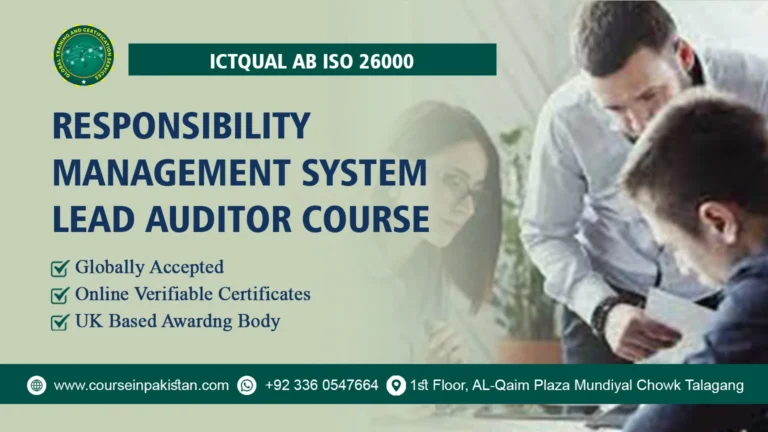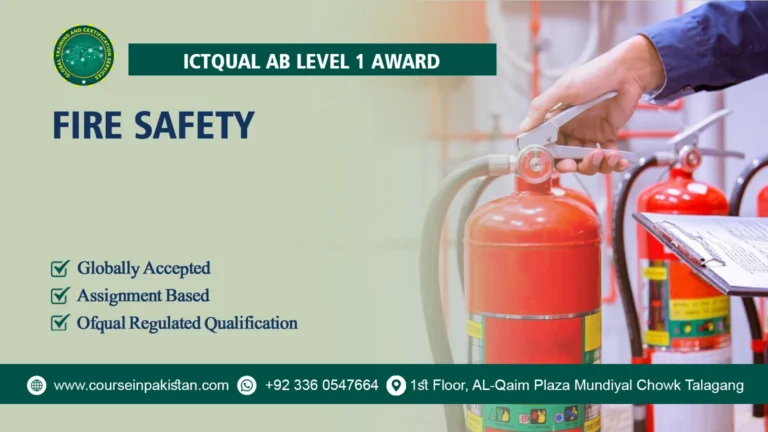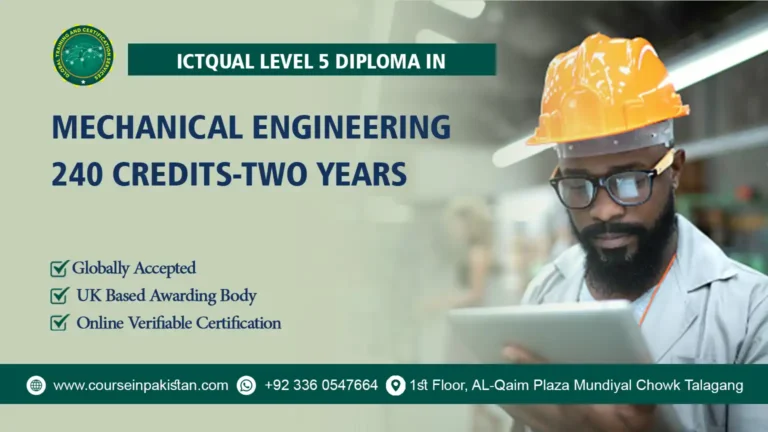
The ICTQual AB Level 6 International Diploma in Environmental Engineering and Management is a globally recognized qualification designed to provide learners with advanced knowledge and practical skills in environmental engineering, sustainable resource management, and environmental compliance. The course focuses on the integration of engineering principles with environmental management practices, preparing learners to develop and implement solutions that address environmental challenges, pollution control, and sustainability objectives. Learners will gain expertise in areas such as waste and water management, air quality monitoring, environmental impact assessment, renewable energy integration, and environmental policy compliance.
This program emphasizes both theoretical understanding and practical application, enabling learners to design, manage, and lead environmental projects, assess sustainability risks, and implement innovative solutions. Graduates will develop strong analytical, problem-solving, and strategic management skills, empowering them to take on leadership roles in industries, government agencies, and organizations focused on environmental engineering and sustainability management.
Course Overview
The ICTQual AB Level 6 International Diploma in Environmental Engineering and Management is a globally recognized qualification designed to equip learners with advanced knowledge and practical skills in environmental engineering, sustainable resource management, and regulatory compliance. This 360-credit, fully assignment-based diploma allows learners to study at their own pace from anywhere in the world. It is British Council verificable and MOFA and Embassy attestable, making it highly suitable for employment, career advancement, and iqama approval. The course covers essential topics such as waste and water management, air quality monitoring, renewable energy integration, environmental impact assessment, and sustainability strategies, preparing learners to design, manage, and lead effective environmental projects.
This qualification is suitable for both fresh learners and experienced professionals. Fresh students are required to complete all 36 mandatory assignments within three years, while experienced and competent individuals with at least six years of relevant experience can complete the certification in a shorter time by submitting verifiable experience and defending their knowledge in professional discussion meetings with an ICTQual AB approved assessor, without completing all mandatory assignments. By the end of the program, learners will have developed the technical expertise, strategic planning skills, and leadership capabilities required to manage environmental engineering projects, ensure compliance with regulations, and implement sustainable solutions in organizations and industries, ensuring career growth and professional recognition both locally and internationally.
Key Highlights of the Course:
- Fully 360-credit Level 6 diploma, flexible and self-paced study
- British Council verificable and MOFA/Embassy attestable qualification
- Suitable for fresh learners and experienced professionals with accelerated pathways
- Focus on practical environmental engineering skills, sustainability, and management
- Globally recognized for career advancement and iqama approval
Course Benefits
Career Advancement
- Prepare for managerial and leadership roles in environmental engineering and sustainability
- Enhance employability in government agencies, private industries, and NGOs
- Gain recognition for expertise in environmental compliance and sustainability management
Professional Recognition
- Obtain a British Council verified and MOFA/Embassy attestable qualification
- Validate professional experience and knowledge for career growth and iqama approval
- Strengthen credibility for international career opportunities in environmental sectors
Flexible Learning
- Complete the diploma entirely through assignments at your own pace
- Accelerated completion option for experienced professionals
- Study from anywhere in the world without strict classroom attendance
Practical Skills Development
- Learn to design and manage environmental projects and sustainability initiatives
- Gain expertise in waste, water, and air management, environmental auditing, and compliance
- Develop problem-solving, leadership, and strategic planning skills in environmental management
Academic and Professional Pathways
- Foundation for postgraduate studies in Environmental Engineering, Sustainability, or Resource Management
- Access to advanced certifications in environmental technologies, renewable energy, or compliance
- Opportunities to join global professional networks and career pathways in environmental management
Course Study Units
This qualification, the ICTQual AB Level 6 International Diploma in Environmental Engineering & Management, consists of 36 mandatory units.
Year 1 – Foundation of Environmental Engineering & Management
- Principles of Environmental Engineering
- Introduction to Environmental Science and Sustainability
- Environmental Legislation and Regulatory Compliance
- Environmental Impact Assessment (EIA) Fundamentals
- Waste Management and Pollution Control
- Water Quality Management and Treatment
- Air Quality Monitoring and Control
- Soil and Groundwater Protection
- Renewable Energy Systems and Applications
- Occupational Health, Safety, and Environmental Awareness
- Communication and Reporting in Environmental Management
- Professional Ethics and Responsibility in Environmental Practice
Year 2 – Applied Environmental Engineering & Management
- Advanced Environmental Risk Assessment
- Industrial Wastewater and Effluent Management
- Solid and Hazardous Waste Engineering
- Environmental Monitoring and Audit Techniques
- Sustainable Resource Management and Conservation
- Climate Change Mitigation and Adaptation Strategies
- Environmental Modelling and Data Analysis
- Green Building and Sustainable Infrastructure
- Environmental Management in Manufacturing and Energy Sectors
- Behavioural and Organisational Approaches to Environmental Safety
- Digital Tools and Technologies in Environmental Engineering
- Research Methods and Environmental Project Planning
Year 3 – Strategic Environmental Leadership & Management
- Strategic Environmental Management and Governance
- Integrated Environmental Management Systems (ISO 14001, ISO 50001)
- Environmental Policy Development and Implementation
- Sustainability Leadership and Corporate Social Responsibility (CSR)
- Environmental Risk Management in Large-Scale Projects
- Renewable Energy Project Management
- International Environmental Standards and Best Practices
- Environmental Innovation and Emerging Technologies
- Environmental Crisis Management and Emergency Planning
- Advanced Occupational Health & Environmental Wellbeing Strategies
- Independent Research Project in Environmental Engineering
- Capstone Project: Applied Environmental Engineering & Management
Learning Outcomes
Year 1 – Foundation of Environmental Engineering & Management
Principles of Environmental Engineering
- Understand fundamental principles of environmental engineering
- Apply engineering methods to solve environmental challenges
- Evaluate the effectiveness of environmental interventions
Introduction to Environmental Science and Sustainability
- Comprehend core concepts of environmental science
- Understand sustainability principles and their application in engineering projects
- Analyze environmental issues and propose sustainable solutions
Environmental Legislation and Regulatory Compliance
- Understand national and international environmental laws and regulations
- Apply legal frameworks to ensure compliance in engineering practices
- Evaluate the impact of legislation on environmental management strategies
Environmental Impact Assessment (EIA) Fundamentals
- Understand the purpose and process of EIAs
- Conduct basic assessments for environmental projects
- Evaluate potential impacts and propose mitigation measures
Waste Management and Pollution Control
- Understand types and sources of waste and pollution
- Apply waste management and pollution control strategies
- Evaluate effectiveness of pollution reduction methods
Water Quality Management and Treatment
- Analyze water quality parameters and standards
- Apply treatment methods for water purification
- Evaluate water management practices for sustainability
Air Quality Monitoring and Control
- Understand air pollution sources and effects
- Apply monitoring techniques and control measures
- Evaluate strategies for maintaining air quality standards
Soil and Groundwater Protection
- Understand soil and groundwater contamination risks
- Apply remediation and protection techniques
- Evaluate environmental management strategies for land and water
Renewable Energy Systems and Applications
- Understand renewable energy technologies and principles
- Apply renewable energy solutions to environmental engineering projects
- Evaluate benefits and limitations of different energy systems
Occupational Health, Safety, and Environmental Awareness
- Understand health, safety, and environmental risks in engineering operations
- Apply safety protocols and awareness practices
- Evaluate compliance with occupational and environmental standards
Communication and Reporting in Environmental Management
- Develop effective communication strategies for environmental projects
- Prepare reports and documentation for stakeholders
- Evaluate the effectiveness of environmental communication
Professional Ethics and Responsibility in Environmental Practice
- Understand ethical principles in environmental engineering
- Apply professional responsibility in project planning and execution
- Evaluate ethical challenges and solutions in environmental management
Year 2 – Applied Environmental Engineering & Management
Advanced Environmental Risk Assessment
- Conduct comprehensive risk assessments for projects
- Apply mitigation strategies to minimize environmental impacts
- Evaluate effectiveness of risk management measures
Industrial Wastewater and Effluent Management
- Understand industrial wastewater characteristics
- Apply treatment methods for effluent management
- Evaluate compliance with environmental regulations
Solid and Hazardous Waste Engineering
- Understand management techniques for solid and hazardous wastes
- Apply engineering solutions for safe disposal and recycling
- Evaluate operational effectiveness and environmental impact
Environmental Monitoring and Audit Techniques
- Apply monitoring tools for environmental performance assessment
- Conduct environmental audits to ensure compliance
- Evaluate audit outcomes for continuous improvement
Sustainable Resource Management and Conservation
- Apply principles of sustainable resource use
- Develop strategies for conservation and efficiency
- Evaluate sustainability outcomes in engineering projects
Climate Change Mitigation and Adaptation Strategies
- Understand climate change impacts and adaptation measures
- Apply mitigation strategies in engineering and management projects
- Evaluate effectiveness of climate action plans
Environmental Modelling and Data Analysis
- Apply modelling techniques to assess environmental systems
- Analyze data to support decision-making
- Evaluate the accuracy and reliability of environmental models
Green Building and Sustainable Infrastructure
- Understand principles of green building and sustainable design
- Apply engineering solutions for environmentally friendly infrastructure
- Evaluate sustainability and efficiency of building projects
Environmental Management in Manufacturing and Energy Sectors
- Understand environmental challenges in industrial and energy contexts
- Apply management strategies to minimize impact
- Evaluate compliance with environmental standards and regulations
Behavioural and Organisational Approaches to Environmental Safety
- Understand organizational culture and behavior in environmental management
- Apply strategies to promote safety and sustainability
- Evaluate effectiveness of organizational interventions
Digital Tools and Technologies in Environmental Engineering
- Apply digital technologies to monitor, model, and manage environmental systems
- Evaluate emerging tools for operational efficiency
- Integrate digital solutions in environmental project planning
Research Methods and Environmental Project Planning
- Apply research methodologies to environmental engineering projects
- Plan, design, and manage environmental initiatives
- Evaluate research outcomes and project feasibility
Year 3 – Strategic Environmental Leadership & Management
Strategic Environmental Management and Governance
- Develop strategic plans for environmental management
- Apply governance frameworks to ensure compliance and effectiveness
- Evaluate long-term sustainability outcomes
Integrated Environmental Management Systems (ISO 14001, ISO 50001)
- Understand environmental management system standards
- Implement ISO-based systems in organizations
- Evaluate system performance and continuous improvement
Environmental Policy Development and Implementation
- Develop policies aligned with environmental and sustainability goals
- Apply implementation strategies in organizations
- Evaluate policy impact on environmental outcomes
Sustainability Leadership and Corporate Social Responsibility (CSR)
- Apply leadership skills in sustainability and CSR initiatives
- Develop programs to enhance organizational environmental responsibility
- Evaluate outcomes and organizational impact
Environmental Risk Management in Large-Scale Projects
- Conduct risk assessments for large and complex projects
- Apply mitigation and monitoring strategies
- Evaluate operational resilience and environmental compliance
Renewable Energy Project Management
- Plan, manage, and implement renewable energy initiatives
- Apply project management principles to energy projects
- Evaluate project performance and sustainability impact
International Environmental Standards and Best Practices
- Understand global environmental standards and best practices
- Apply international guidelines to local or organizational projects
- Evaluate compliance and operational performance against benchmarks
Environmental Innovation and Emerging Technologies
- Identify innovative solutions for environmental challenges
- Apply emerging technologies to improve operations
- Evaluate the benefits and limitations of new technologies
Environmental Crisis Management and Emergency Planning
- Develop strategies for environmental emergencies and crises
- Apply risk mitigation and emergency response frameworks
- Evaluate effectiveness of crisis management measures
Advanced Occupational Health & Environmental Wellbeing Strategies
- Implement advanced safety and wellbeing practices
- Promote environmental health in organizational operations
- Evaluate outcomes for operational safety and employee wellbeing
Independent Research Project in Environmental Engineering
- Conduct independent research addressing a relevant environmental issue
- Apply scientific and engineering methodologies
- Present findings with actionable recommendations
Capstone Project: Applied Environmental Engineering & Management
- Integrate knowledge from the entire program into a practical project
- Plan, implement, and evaluate a comprehensive environmental initiative
- Demonstrate competence in strategic planning, leadership, and technical expertise
Who is This Course For?
Aspiring Environmental Professionals
- Individuals seeking a career in environmental engineering, sustainability, and resource management
- Fresh graduates aiming to gain a globally recognized qualification in environmental management
Experienced Practitioners
- Professionals working in environmental compliance, waste management, or industrial sustainability
- Individuals looking to enhance strategic leadership, project management, and technical expertise in environmental engineering
Independent and Self-Motivated Learners
- Learners who prefer flexible, self-paced, assignment-based study
- Individuals capable of completing assessments remotely from anywhere in the world
Future Leaders and Strategists
- Learners aspiring to senior management or executive roles in environmental projects and sustainability programs
- Professionals aiming to lead corporate social responsibility (CSR) and sustainable development initiatives
Globally Oriented Professionals
- Individuals seeking a qualification verified by the British Council and attestable by MOFA/Embassy
- Professionals targeting iqama approval or international career opportunities in environmental sectors
Future Progression
- Leadership and senior management roles in environmental engineering, sustainability, and resource management
- Strategic positions in government agencies, environmental consultancies, NGOs, and private industries
- Specialist roles in waste management, water and air quality management, and renewable energy projects
- Opportunities to lead environmental audits, compliance programs, and sustainability initiatives
- Access to global projects requiring professional recognition and attestable qualifications
Academic Pathways:
- Progression to postgraduate studies in Environmental Engineering, Sustainability, or Environmental Management
- Advanced professional certifications in renewable energy, environmental compliance, or sustainability Management
- Specialization programs in climate change mitigation, environmental risk management, or green infrastructure
Conclusion
The ICTQual AB Level 6 International Diploma in Environmental Engineering & Management is a flexible, globally recognized qualification designed for both fresh learners and experienced professionals. With 36 mandatory units and 360 credits, the course develops advanced knowledge and practical skills in environmental engineering, sustainability management, and strategic leadership. Fresh learners complete all assignments within three years, while experienced professionals with relevant experience can complete the program in a shorter time through professional discussion assessments. Verified by the British Council and attestable by MOFA and Embassy, this diploma equips learners with the expertise, credentials, and confidence to manage environmental projects, ensure regulatory compliance, and lead sustainability initiatives, enhancing career prospects both locally and internationally.






